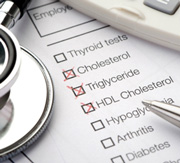< Return to trials
High Triglycerides

Definition
Triglycerides are the end product of digesting and breaking down fats in meals. They are are important to human life and are the main form of fat in the body.
High triglyceride levels would be considered more than 200 milligrams per deciliter (mg/dL).
Description
High triglyceride levels may lead to heart disease, especially in people with low levels of "good" cholesterol and high levels of "bad" cholesterol, and in people with type 2 diabetes. Experts disagree, though, on just how bad of an effect high triglyceride levels by themselves have on the heart.
Some of the confusion stems from the fact that high triglycerides have a tendency to appear with other risk factors. We do know that a low level of good cholesterol is a risk factor for heart disease. We also know that blood tests for triglycerides can show some variability.
Many experts believe that high triglycerides may be a sign of other heart disease risk factors. That is, high triglyceride levels could multiply the bad effects of high cholesterol, high blood pressure, and diabetes.
Causes and Symptoms
High triglyceride levels are likely caused by bad diet, obesity, belly fat, eating excess saturated fat, trans fat and cholesterol and carbohydrates, drinking alcohol in excess.
There are not symptoms directly linked to high triglycerides.
Source
http://www.webmd.com/cholesterol-management/lowering-triglyceride-levels
If you have high triglycerides or think you may have high triglycerides, contact us today to learn more about our current study opportunities for this diagnosis.
Call us at (701) 232-7705 or toll-free at (866) 532-7705.
Signup online or email our recruiter at recruiter(at)lillestolresearch(dot)com.
Your information is always kept confidential.